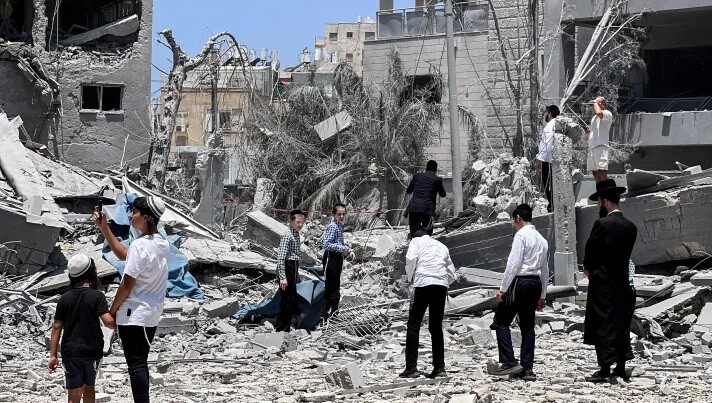
As tensions escalated between Israel and Iran, the Vietnamese government took swift action to protect its citizens, successfully evacuating a total of 78 Vietnamese nationals. Of these, 63 have already returned to Vietnam, with the remaining individuals confirmed to be in safe locations. This evacuation operation was successfully carried out under the guidance of the Vietnamese Ministry of Foreign Affairs, with close cooperation between the Vietnamese Embassies in Israel and Iran, as well as Vietnamese diplomatic missions in Russia and Egypt.
Outbreak of Conflict and Immediate Response from the Vietnamese Government
In recent weeks, military tensions between Israel and Iran dramatically heightened. Iran's missile attack on Israeli territory, in particular, raised serious concerns about regional security. In Beersheba, southern Israel, buildings were damaged by the Iranian missile attack, clearly demonstrating the severity of the conflict.
Faced with this crisis, the Vietnamese Ministry of Foreign Affairs immediately initiated a response. On Thursday, July 3rd, spokesperson Pham Thu Hang stated at a press conference, "Amidst new developments in the Middle East situation, the Ministry of Foreign Affairs and all relevant domestic authorities have continuously provided guidance to Vietnamese diplomatic missions in Israel and Iran, maintained a hotline for citizen protection, and instructed them to report any issues to the Ministry of Foreign Affairs and relevant authorities." This underscores the Vietnamese government's firm commitment to prioritizing the safety of its citizens.
Successful Evacuation Operation: The Importance of Cooperation
The success of this evacuation operation was due to the dedicated efforts of Vietnamese diplomatic missions and international cooperation. The Vietnamese Embassies in Israel and Iran closely monitored the situation through continuous communication with local authorities and were prepared to provide immediate assistance when needed. Notably, Vietnamese diplomatic missions in Russia and Egypt played crucial roles in securing safe travel routes via land and air.
During the evacuation, 78 Vietnamese citizens were safely moved out of the conflict zone. A significant number of them were identified as students and workers residing in Israel and Iran for study or employment. The Vietnamese government provided them with necessary supplies and psychological support to facilitate their return, and currently, 63 have safely arrived back home.
Current Situation and Future Plans
Currently, tensions between Israel and Iran have somewhat eased following a ceasefire agreement, and the Vietnamese Ministry of Foreign Affairs has stated that the situation of the Vietnamese community residing in both countries is stable, with no casualties reported. However, the Vietnamese Ministry of Foreign Affairs continues to closely monitor the situation and remains fully prepared to ensure the safety of its citizens amidst the uncertain Middle East landscape.
Spokesperson Pham Thu Hang emphasized, "The diplomatic missions concerned are closely cooperating with the authorities of the host countries, neighboring Vietnamese diplomatic missions, and other relevant authorities to meticulously monitor the situation and are prepared to take all measures to ensure the safety of Vietnamese citizens and diplomatic missions in case of an emergency."
The Vietnamese Ministry of Foreign Affairs continues to urge its citizens residing in Israel and Iran to strictly comply with the safety and security guidelines of local authorities and to maintain close and regular contact with the relevant diplomatic missions. Vietnamese embassies operate emergency hotlines to provide prompt assistance for citizens' inquiries and emergency situations.
This successful evacuation operation once again reaffirmed the Vietnamese government's steadfast policy of prioritizing the safety of its citizens residing abroad. Vietnam will continue to actively respond to changes in the international situation and will not neglect its efforts to protect its citizens.
[Copyright (c) Global Economic Times. All Rights Reserved.]




























